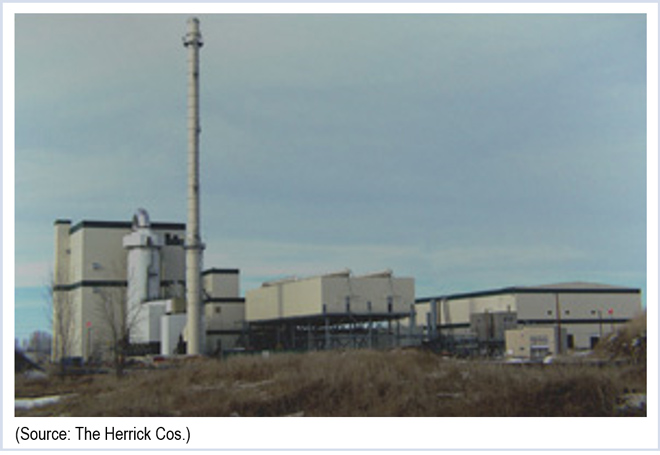By Chris O’Malley
Creditors of the 55-MW Fibrominn power plant — the first in the U.S. designed to burn poultry litter as its primary fuel — have won federal approval to gobble up the Minnesota facility from receivership.

Benson Power was formed to acquire and operate the plant and has no other FERC-jurisdictional or power-related assets. Benson is owned by CPV Biomass and several insurance companies that provided $202 million toward its construction. They include Prudential, The Hartford, John Hancock Life Insurance, Nationwide and Metropolitan Life.
The output of the Fibrominn plant will continue to be sold to Northern States Power under an existing 21-year long-term power supply contract.
The plant, located in Benson, Minn., was lauded after its 2007 opening for its practical use of waste from the region’s abundant turkey and chicken farms.
But it has struggled in recent years. Bird flu has reduced supplies of the odiferous biomass it turns into megawatts. The plant has had to turn to other bio material, such as wood chips.
Also making the plant less competitive are the drop in natural gas prices and improving economics for wind and solar energy. Two years ago, Fibrominn began defaulting on debt.
FERC found that the transfer of the plant will not result in adverse effects on competition or rates, nor inappropriate cross-subsidization of a non-utility asset. The commission said Class B and Class C members — largely consisting of the insurance companies — hold only a passive interest.
The insurance companies have indirect interests in other power ventures. Prudential, for example, has non-controlling interests in the 150-MW Elk River Wind Farm in Kansas. And Metlife has a stake in operations including the 32-MW Long Island Solar Farm.
The Class A holder, which will serve as sole management member of the plant, is CPV Biomass, which is owned by Silver Spring, Md.-based Competitive Power Ventures.
FERC said CPV does not own or control other generation in the MISO territory.
However, the former owners of PowerMinn’s parent company, the Herrick family, cried foul. They filed a motion to intervene in the transfer application, contending that they are owed payments related to production tax credits involving the plant. They expressed concern that their rights could be extinguished by the transaction.
But FERC ruled that the Herrick protest was outside of the scope of the proposal before the commission.
Future Viability?
As of January, the plant owed creditors nearly $240 million, while its fair market value was under $79 million. The application filed with FERC does not elaborate on the strategy Benson will take to improve the plant’s viability.
While designed to burn poultry litter for up to 90% of its fuel needs, the plant has relied mostly on more expensive wood chips. The Minnesota bird flu crisis has reportedly resulted in the deaths of nearly 4.2 million turkeys and nearly 1.6 million chickens since March.
Major poultry producers are making deliveries “when they can” from uninfected farms, the plant’s manager told the Associated Press.
Donald Atwood, a CPV vice president, told the AP his company has a multi-year contract to manage the facility for the note-holders.
“I don’t know what the lenders have in mind for the future,” Atwood said, adding that he expects to continue to burn poultry litter.
“We’ll adjust our fuel percentages based on market conditions,” he said. “I’m highly confident that the project will be successful.”


